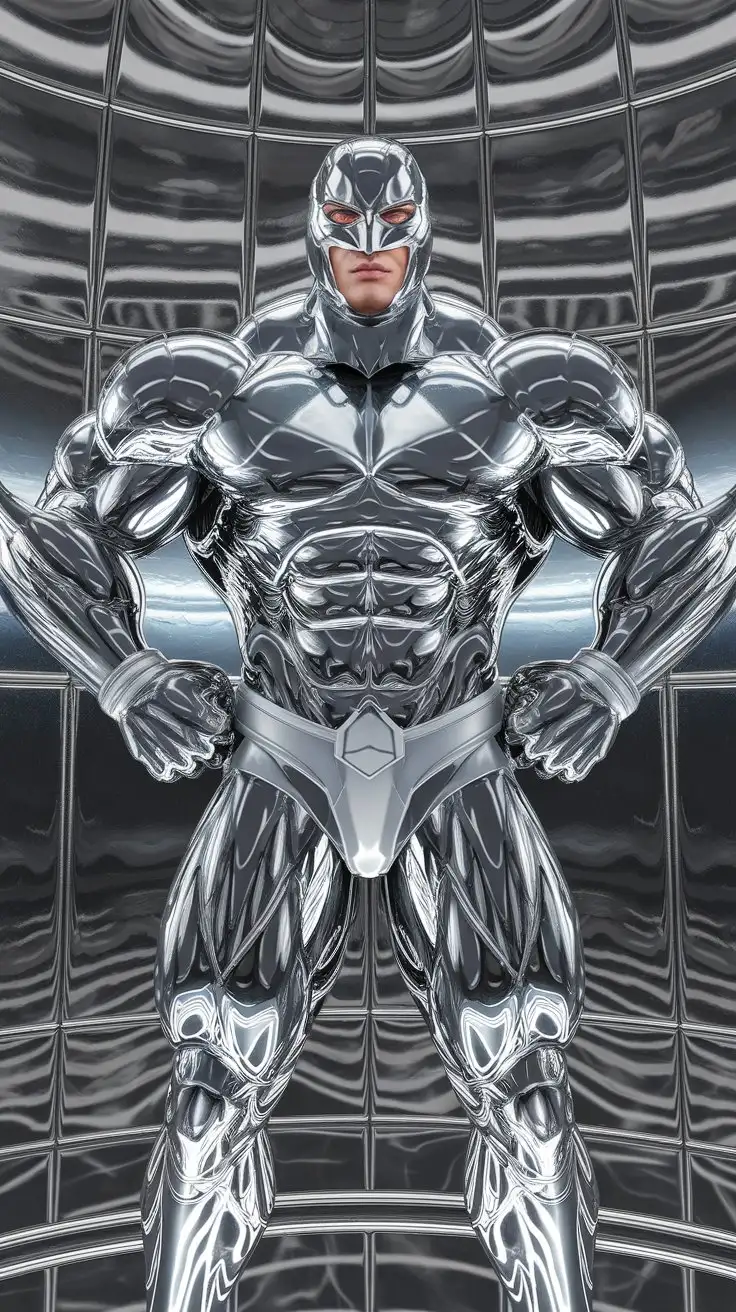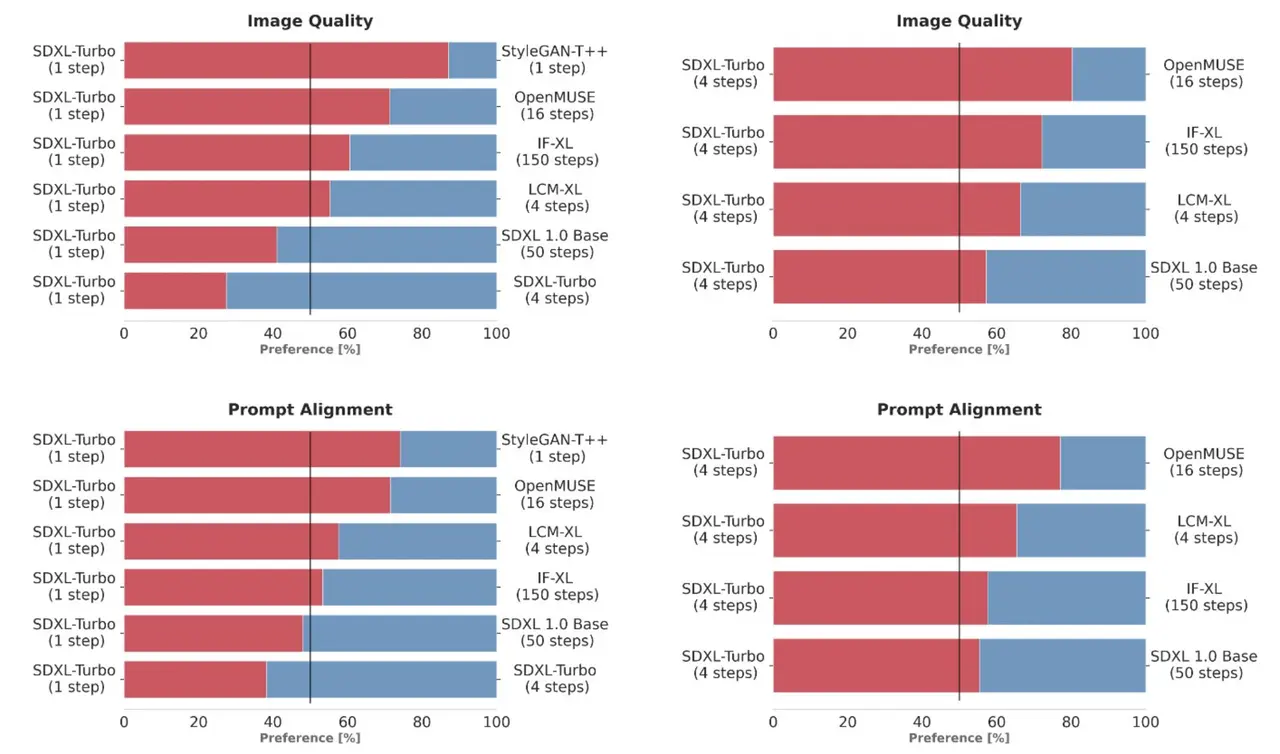Try SDXL Turbo For Free!
Enter your prompt and wait for a second, let SDXL Turbo amaze you.

A haunting wide shot of an immense Cthulhu-like kraken rising from the depths of a fog-drenched shoreline, water cascading off its ancient, moss-covered form, glowing red eyes piercing the mist, colossal tentacles writhing in the air, a lone human figure standing motionless on the rocky beach below, overwhelmed by the presence, under an eerie teal-hued sky at dawn, shot with a Leica SL2, 28mm f/1.4 lens, cinematic color grading with deep sea greens and spectral blue highlights

In a chrome chamber. A hugely ripped muscle man being transformed by luminous cosmic energies into a superpowered knight of truth and justice. 20 years old. Photorealistic.

Becoming kindred with Hercules. Muscle, strength, power, destiny. 18 years old. Mighty transformation. Photorealistic.

In a stone chamber. A medieval knight stands boldly, bombarded with luminous golden energy, flexing as his muscles burst through his armor. Receiving awesome superpowers. 24 years old. Photorealistic.

18-year-old bodybuilder stands in an empty gym at night, receiving awesome cosmic superpowers from the gods. Waves of silver and blue electricity flow into him. Becoming a mighty, godlike superhero. Photorealistic.

In a stone chamber. A medieval knight stands boldly, bombarded with luminous golden energy, flexing as his muscles burst through his armor. 24 years old. Photorealistic.

A full-body shot of a college bodybuilder standing confidently in a torn gray t-shirt and torn jeans. He flexes his bulging muscles as they tear through the fabric of his shirt and jeans. Glowing with luminous golden energy. Becoming an ultraman. 22 years old. Photorealistic.

A wide, slightly elevated shot of a minimalist bedroom featuring a wardrobe seamlessly integrated with a built-in desk. The wardrobe section has handleless doors, and the desk area is clean with a simple chair. The bedroom has a minimalist design with neutral colors and good natural light.

A college bodybuilder stands on a dais in ancient temple, receiving the powers of the tempest, transforming into a powerfully muscled, hugely ripped, super pumped warrior colossus. Awesome superpowers. Mighty confidence. 20 years old. Photorealistic.

A haunting wide shot of an immense Cthulhu-like kraken rising from the depths of a fog-drenched shoreline, water cascading off its ancient, moss-covered form, glowing red eyes piercing the mist, colossal tentacles writhing in the air, a lone human figure standing motionless on the rocky beach below, overwhelmed by the presence, under an eerie teal-hued sky at dawn, shot with a Leica SL2, 28mm f/1.4 lens, cinematic color grading with deep sea greens and spectral blue highlights

a woman's knee with a perfectly executed Greek key pattern tattoo wrapping around it. The design features sharp, geometric lines forming the classic meander motif. The ink is a bold black on a light skin tone. The lines should be precise and evenly spaced.

Becoming kindred with Hercules. Muscle, strength, power, destiny. 18 years old. Mighty transformation. Powerfully muscled. Photorealistic.

32-year-old, powerfully muscled, hugely ripped superhero stands in an empty gym at night, clad in a skintight uniform. Shouting 'I am ULTRAMAN!!!' Photorealistic.

A realistic and high-resolution image of a modern cabin in the middle of the mountain. The cabin has large windows that allow you to see a warm interior lit by soft and welcoming lights, creating an enchanting contrast with the cold fog outside. Around, there are dense trees and a mountainous landscape that blurs slightly due to the mist, giving it a mystical and serene atmosphere. The composition highlights the fusion between modernity and nature, with clear details in the architecture and a peaceful and warm atmosphere.

A full-body shot of a college bodybuilder standing confidently in a gray t-shirt and jeans. He flexes his muscles as they rip through the fabric of his shirt and jeans. Glowing with luminous golden energy. 22 years old. Photorealistic.

Wearing white stockings in a two-dimensional style girl

A wide, angled view of a minimalist bedroom corner featuring a sleek, white corner cupboard with a single hinged door. The cupboard blends seamlessly into the walls. The bedroom has a light wooden floor and a simple bedside table with a small plant. Natural light illuminates the corner.

A college bodybuilder stands on a dais in ancient temple, receiving the powers of the tempest, Mighty confidence. Awesome power. Becoming a superhero. 20 years old. Photorealistic.

A dramatic wide shot of a gigantic kraken rising out of the stormy sea, colossal tentacles thrashing through towering waves, a ship caught in the chaos below, lightning illuminating the dark skies, during a violent thunderstorm at dusk, shot with a Canon EOS R5, 16-35mm f/2.8 lens, dark moody color palette with electric blue highlights

In a chrome chamber. A hugely ripped, superpowered knight of truth and justice. 20 years old. Photorealistic.

A cyberpunk-style Chinese ink wash landscape painting, misty mountains with neon-lit pagodas, flying cars between peaks, traditional brush strokes mixed with futuristic technology, glowing rivers and digital clouds, moody atmosphere, high detail, 4K

32-year-old, powerfully muscled, hugely ripped bodybuilder stands in an empty gym at night, receiving awesome cosmic superpowers from the gods. Glowing with blue and silver energy and electricity. Becoming a mighty, godlike superhero. Overwhelming ecstasy. Photorealistic.

Blessed by the gods of superpowered muscles, becoming a mighty hero. 23 years old. Photorealistic.

In a stone chamber. A powerfully built medieval muscle knight stands boldly, bombarded with luminous golden energy, flexing as his muscles burst through his armor. Receiving awesome superpowers from the gods, becoming a medieval ultraman. 24 years old. Photorealistic.

A medium shot of a well-dressed teenager in a slim-fit light grey suit. He's wearing a light blue dress shirt and a silver patterned tie. He has neatly styled hair and is looking directly at the camera with a confident gaze. The background is a blurred urban setting at twilight

A wide-angle, photorealistic image of a minimalist bedroom featuring a sleek, light oak wood wardrobe with two large sliding doors. The wardrobe has simple, handleless design. The bedroom has white walls, a light-colored wooden floor, and soft natural light streaming in from a window. A simple bed with white linens is partially visible in the foreground. Focus is on the wardrobe, showcasing its clean lines and space-saving design.

A powerfully muscled, hugely ripped, pumped bodybuilder stands on a dais in an ancient temple, receiving the powers of the tempest, Mighty confidence. Awesome power. Becoming a superhero. 24 years old. Photorealistic.

A hugely ripped superpowered knight of truth and justice. 20 years old. Photorealistic.

In a chrome chamber. A hugely ripped muscle man being transformed by luminous cosmic energies into a superpowered knight of truth and justice. 20 years old. Photorealistic.

A pixel art of a person with black hair, a half blue half purple hat with black hair. 1 blue eye, 1 purple one, wearing a black shirt with a half purple half blue short sleeved cardigan, wearing a strap around 1 shoulder with pokeballs on it. he is wearing dark blue ripped jeans He is looking toward the screen to the left HALF BLUE PLAID CARDIGAN short pulled foward hair and a man not a female, but keep the blue ear studs. body facing left more pixelated but high quality

23-year-old, powerfully muscled bodybuilder stands in an empty gym at night, receiving awesome cosmic superpowers from the gods. Waves of silver and blue electricity flow into him. Becoming a mighty, godlike superhero. Photorealistic.

Blessed by the gods of superpowered muscles, a mighty superhero. 33 years old. Photorealistic.

A full-body shot of a college bodybuilder standing confidently in a gray t-shirt and jeans. He flexes his bulging muscles as they tear through the fabric of his shirt and jeans. Glowing with luminous golden energy. Becoming an ultra man. 22 years old. Photorealistic.

A full-body shot of a stylish young man standing confidently in a tailored royal blue two-piece suit. He's wearing a white dress shirt, a patterned tie in shades of burgundy and navy, and a matching burgundy pocket square. The setting is a softly lit, elegant ballroom. He's smiling slightly, exuding charm.

A college bodybuilder stands on a dais in an ancient temple, receiving the powers of the maelstrom, transforming into a powerfully muscled, hugely ripped, super pumped warrior colossus. Awesome superpowers. Mighty confidence. 20 years old. Photorealistic.

Medium shot, unlikely animal friends, curious ginger cat and a fluffy black Cochin chicken, nose to nose, sniffing each other, backyard patio setting, potted plants, friendly interaction, gentle curiosity, pet chicken and cat, daytime
What is Stable Diffusion 3 and what's new in it ?
Innovative Technologies and Architecture
Released on April 17, 2024, Stable Diffusion 3 features cutting-edge technologies such as the rectified flow technique and the Multimodal Diffusion Transformer architecture. These advancements streamline the image generation process and improve the integration of visual and textual data, significantly enhancing the quality and accuracy of the generated images.
Enhanced Text and Image Quality
The model utilizes a powerful combination of text encoders, including CLIP G14, CLIP L14, and T5 XXL, which greatly improve the text rendering capabilities, particularly in terms of spelling accuracy. It is trained on diverse datasets like COCO 2014 and ImageNet, using advanced de-duplication techniques to ensure a wide variety of high-quality training examples.
Scalability and Open-Source Ethos
Demonstrating its scalability, Stable Diffusion 3 shows continuous improvement with increases in model size and data volume. Stability AI’s commitment to open-sourcing the model promotes transparency in AI development and helps reduce environmental impacts by avoiding redundant computational experiments. This approach ensures that the benefits of AI advancements are accessible to a broader community.
SDXL Turbo Examples

Key Features and Benefits of SDXL Turbo
Revolutionary Performance
SDXL Turbo sets a new standard in text-to-image generation with its groundbreaking Adversarial Diffusion Distillation (ADD) technology. This innovative approach allows for rapid, single-step image generation, a significant leap forward from the traditional multi-step processes.
Enhanced Image Quality
Unlike other models, SDXL Turbo produces images of exceptional clarity and detail. By leveraging the strengths of Generative Adversarial Networks (GANs), it ensures images are crisp and vivid, avoiding common issues like blurriness or artifacts.
Real-Time Generation Capabilities
Ideal for applications demanding speed and efficiency, SDXL Turbo excels in generating high-quality images in real-time. This makes it a perfect fit for dynamic environments such as video games, virtual reality, and instant content creation.
Computational Efficiency
On high-end GPUs like the A100, SDXL Turbo can generate a 512x512 image in just 207ms, including prompt encoding, a single denoising step, and decoding. This efficiency represents a monumental improvement in both time and energy consumption over previous models.
Wide Range of Applications
The model’s versatility makes it suitable for diverse applications, from creating artistic and design works to aiding in educational and research projects. Its real-time generation ability opens new possibilities in interactive media and online content creation.
User Accessibility
SDXL Turbo’s ease of use is a key feature. With simple setup requirements and an intuitive interface on platforms like Clipdrop, it’s accessible to both professionals and hobbyists alike, regardless of their technical background. - Research and Development Opportunities: For researchers and developers, SDXL Turbo presents an unparalleled opportunity to explore advanced AI in image synthesis. The model’s unique approach and performance offer a rich ground for academic and commercial research.
In-Depth Technical Details and Model Information of SDXL Turbo
Innovative Model Architecture
At the core of SDXL Turbo lies the novel Adversarial Diffusion Distillation (ADD) technique. This unique architecture combines the best of generative adversarial networks (GANs) with diffusion model technologies, enabling the model to synthesize high-fidelity images in just a single step. This significant technical innovation represents a leap forward from the foundational SDXL 1.0 model, making SDXL Turbo more efficient and powerful in image generation.
Comprehensive Research and Development
Developed and funded by Stability AI, SDXL Turbo is the result of extensive research and development efforts. It stands as a distilled version of the SDXL 1.0, specifically trained for real-time synthesis. The model's design and training process are detailed in an extensive research paper, which is available for public access. This document offers deep insights into the technical workings and the innovative aspects of SDXL Turbo.
Technical Specifications
SDXL Turbo excels in generating photorealistic images from text prompts in a single network evaluation. This capability is a result of the Adversarial Diffusion Distillation method, which allows for high-quality sampling in one to four steps. The model is fine-tuned from the base of SDXL 1.0, maintaining high image quality while dramatically reducing the steps required for image synthesis.
Model Accessibility and Resources
For researchers and AI enthusiasts, SDXL Turbo’s model weights and code are readily available on platforms like Hugging Face. Additionally, the model’s implementation can be found in Stability AI's generative-models GitHub repository, which includes popular diffusion frameworks for both training and inference. These resources are instrumental for anyone looking to explore or utilize this state-of-the-art model in their projects or research.
Interactive Demonstrations and Tutorials
To facilitate understanding and adoption of SDXL Turbo, the website can feature interactive demos and tutorials. These resources can help users experience the model's capabilities firsthand and guide them through its various applications, from simple text-to-image generation to more complex image-to-image transformations.
Links to Further Reading and Research Papers
Providing direct links to the research paper and other technical documents allows visitors to delve deeper into the science and engineering behind SDXL Turbo. These resources are crucial for academics, researchers, and technology enthusiasts who wish to gain a comprehensive understanding of the model's inner workings.

Download, Trial, and Usage Information of SDXL Turbo
Free Trial and Experience on sdxlturbo.ai
The most exciting feature for visitors to sdxlturbo.ai is the opportunity to experience and use SDXL Turbo for free. Emphasize this at the forefront of the section: "Try SDXL Turbo firsthand at no cost on sdxlturbo.ai! Experience the power of real-time text-to-image generation directly through our platform." This invitation allows users to engage with the technology immediately, showcasing the model's capabilities and user-friendliness.
Easy Accessibility for All Users
Highlight the ease with which both novices and experts can access and use SDXL Turbo on the website. The platform is designed to be intuitive, ensuring that even users with minimal technical background can start generating images in moments. This feature broadens the appeal of SDXL Turbo, making it accessible to a wide audience, including educators, artists, researchers, and hobbyists.
Model Download and Implementation
For those interested in more technical engagement, provide clear instructions and links for downloading SDXL Turbo’s model weights and code from repositories like Hugging Face. This section caters to developers and researchers looking to integrate SDXL Turbo into their own projects or conduct in-depth analysis and customization.
SDXL Turbo Related Tweets
Frequently Asked Questions
What is SDXL Turbo?
SDXL Turbo is a state-of-the-art text-to-image generation model that utilizes Adversarial Diffusion Distillation (ADD) for high-quality, real-time image synthesis.
Is SDXL Turbo free to use?
Yes, SDXL Turbo is available for free, non-commercial use on sdxlturbo.ai, where users can experience and test its capabilities.
Can I use SDXL Turbo for commercial purposes?
Currently, SDXL Turbo is released under a non-commercial research license. For commercial use, please contact us through sdxlturbo.ai for further information.
How does SDXL Turbo differ from other text-to-image models?
SDXL Turbo leverages ADD technology, enabling it to generate high-quality images in a single step, significantly faster than traditional multi-step models.
What are the system requirements to use SDXL Turbo?
SDXL Turbo can be used on most modern systems with internet access. For developers, using a system with a capable GPU like NVIDIA's A100 enhances its performance.
Can I integrate SDXL Turbo into my own applications?
Yes, developers can integrate SDXL Turbo into their applications using the model weights and code available on Hugging Face and GitHub, adhering to the non-commercial license terms.
What image resolution does SDXL Turbo support?
SDXL Turbo is optimized for generating 512x512 pixel images, balancing quality and computational efficiency.
Does SDXL Turbo support text-to-video generation?
Currently, SDXL Turbo specializes in text-to-image generation. Text-to-video capabilities are not available in this version.
How can I access SDXL Turbo’s model weights and code?
The model weights and code are available on Hugging Face and Stability AI’s generative-models GitHub repository.
Are there any limitations to the content SDXL Turbo can generate?
Yes, SDXL Turbo may have limitations in rendering legible text, faces, and certain complex scenarios. It’s also governed by an ethical use policy to prevent misuse.
Can SDXL Turbo generate images from any text prompt?
SDXL Turbo is designed to generate images from a wide range of text prompts, though its accuracy and quality may vary depending on the prompt’s specificity and complexity.
Is it possible to customize images generated by SDXL Turbo?
Yes, users can influence the outcome by adjusting the text prompts, though the current version does not support fine-grained control over every aspect of the generated image.
How does SDXL Turbo ensure the ethical use of AI?
SDXL Turbo adheres to Stability AI’s Acceptable Use Policy, which guides against generating harmful or misleading content.
What support is available for new users of SDXL Turbo?
New users can access a range of resources, including tutorials, user guides, and a community forum on sdxlturbo.ai.
Can I contribute to the development of SDXL Turbo??
Yes, developers and researchers are welcome to contribute, especially those focusing on AI and image generation technology, by adhering to the guidelines provided on our repository.
Are there any plans to improve SDXL Turbo further?
Continuous improvements and updates are planned, with a focus on enhancing performance, expanding capabilities, and ensuring ethical AI practices.
Can SDXL Turbo be used for educational purposes?
Absolutely, SDXL Turbo is a valuable tool for educational purposes, particularly in fields related to AI, computer graphics, and media studies.
How does SDXL Turbo handle data privacy and security?
User data privacy and security are top priorities. SDXL Turbo complies with all relevant data protection regulations and does not store personal data without consent.
Is there a community for SDXL Turbo users?
Yes, there’s an active online community where users can share experiences, get help, and discuss best practices.
Where can I find more detailed documentation on SDXL Turbo?
Detailed documentation is available on sdxlturbo.ai and within the repositories on Hugging Face and GitHub.